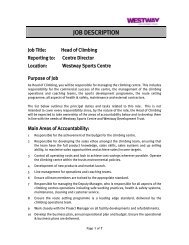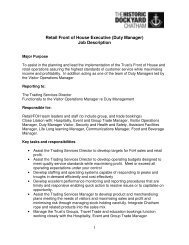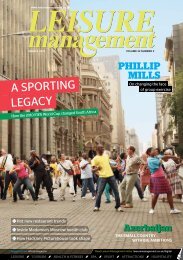Leisure Media Issue 3 2009 - Leisure Opportunities
Leisure Media Issue 3 2009 - Leisure Opportunities
Leisure Media Issue 3 2009 - Leisure Opportunities
- No tags were found...
Create successful ePaper yourself
Turn your PDF publications into a flip-book with our unique Google optimized e-Paper software.
BURNING QUESTIONIs the recession threatening thefuture of sports clubs in the UK?According to a new study by Deloitte for the CCPR, up to four per cent of communitysports clubs – 6,000 in total – are facing closure in the next year as a result of theeconomy. Pete Hayman examines what the future holds for sports clubs in the UKCCPR, the umbrella organisation for 290 national governingbodies and representative bodies for sport and recreation, hasrecently published new research examining the impact of therecession is having on community sports clubs in the UK.Almost half of all the clubs that participated in the study haveadmitted that the situation is likely to get worse before it getsbetter, with the turbulent economic climate having a significanteffect on membership numbers and revenue.As a result, clubs are already looking to cut back investmentin facilities, coaching and community schemes to offset increasingcosts that are being driven up by the introduction of newgovernment regulations and soaring energy bills.But with the London 2012 Olympic and Paralympic Gamesjust three years away, is enough being done to ensure that clubscan weather the economic storm and to ensure that Britain canfulfil a promise to itself to become a world leader in sports?The data shows that sports clubsare in trouble. CCPR has beenpushing the government to domore for sports clubs through its Subsfor Clubs campaign and by fightingoff the endless increases in regulationwhich increase their costs.This survey shows that, unless weact, thousands of local sports clubscould go under. That would be a tragicshame for both their members and theirlocal communities.Even those which survive the recessionare telling us that they are goingto have to make cutbacks. Thesesports clubs have to make ends meetand falls in subscriptions will be metwith reductions in coaching, withinvestment in kit and facilities and inport – along with other sectors– is facing tough economicSchallenges, so we all need tobe vigilant. But that doesn’t meanwe should be unduly pessimistic.Grassroots sport is in good shape andour latest participation survey hasrevealed that the number of people participatingregularly is increasing.So how do we deal with the challengesthat lie ahead? Firstly, we needto stand tall and stand together. Wewill support governing bodies in theirefforts to put clubs in a position toweather the challenges. That’s notgoing to be an easy task, but havingthe readiness to adapt and the determinationto find the ‘value offer’ for yoursport or your club will stand our sectorin good stead for the future.BRIGID SIMMONDSChairCCPRRICHARD LEWISChairSport EnglandFor our part, we must make suregrassroots sport derives maximumvalue for money from all SportEngland’s investments. By monitoring,and sharing, the intelligence on what’sworking and what’s not working, wecan isolate the pressure points andhelp sports overcome issues. We alsoneed to be brave and nimble enoughto adjust our plans if evidence showssomething isn’t working. Our openfunding rounds provide us with someflexibility to target investment at areaswhich may have been affected by thecommunity programmes. There can beno doubt that cuts will set us back.The government also needs sportsclubs to help introduce the five houroffer for sport in schools. They simplydon’t have the staff or the commitmentfrom schools without involving localsports clubs in the scheme.What we need now is a moratoriumon any new regulations, laws andcharges affecting sports clubs. We arealready fighting off liquor licensingfees, drainage charges from multimillionpound water companies, adevelopment tax and music licencefees. Sport needs all the support it canget but, from the reception we receivein some government departments, youwould think we were selling cigarettesor fatty foods, rather than sport!We know that sports clubs are likelyto go to the wall as a result of therecession. But what we don’t want todo is to compound that with any newregulations which could push still moreof them over the edge.economic downturn. Encouragingly,there has already been considerableinterest in the first of our larger investmentrounds, which will create a rangeof sporting opportunities for people inrural communities.Sport can, and will, be an importantpart of the solution to this recession.Sport drives employment, it keeps peoplefit and healthy and it helps peopleto develop attributes such as leadership,team-work and determinationthat will help them and this country toemerge stronger from a difficult period.18 Read <strong>Leisure</strong> Management online leisuremanagement.co.uk/digitalISSUE 3 <strong>2009</strong> © cybertrek <strong>2009</strong>
















